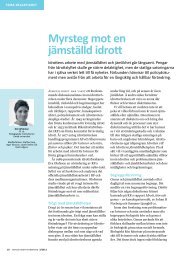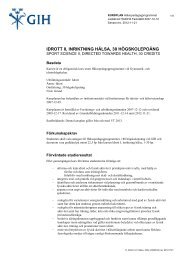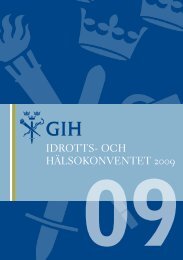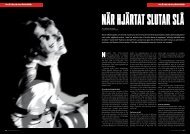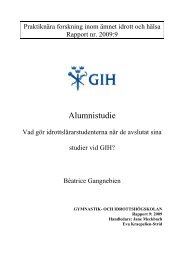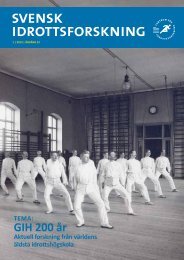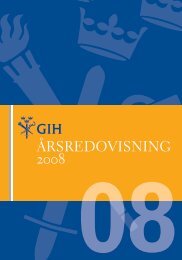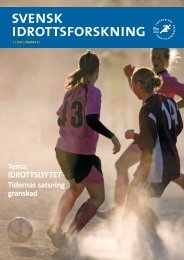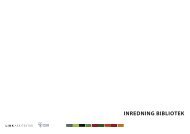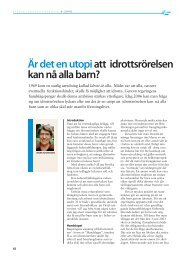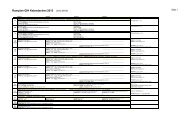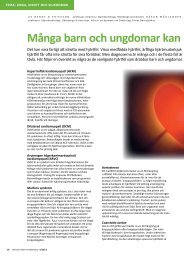Programme and abstracts - GIH
Programme and abstracts - GIH
Programme and abstracts - GIH
Create successful ePaper yourself
Turn your PDF publications into a flip-book with our unique Google optimized e-Paper software.
Abstracts, Thursday June 6 th , 16.15-17.15, Oral paper presentationsTitle:‘Outdoor Journeys’: Reflecting on secondary teachers’ <strong>and</strong> pupils’ experiences of local, urbanoutdoor journeys in Maths <strong>and</strong> Geography.Author/s:Beth Christie, University of Edinburgh, UK.Abstract:Outdoor Journeys is a school-based teaching approach that enables pupils to learn about thepeople <strong>and</strong> place in which they live. By planning <strong>and</strong> undertaking local journeys, pupils areable to work together <strong>and</strong> learn across the curriculum in manner that is active, integrated,holistic <strong>and</strong> contextualised. This paper considers recent research with Maths <strong>and</strong> Geographyteachers <strong>and</strong> students (12-15 years old) from three Secondary schools in Scotl<strong>and</strong>. The studycomprised participant observation, short questionnaires <strong>and</strong> interviews <strong>and</strong> involvedapproximately 150 students <strong>and</strong> 10 teachers across three schools. In most cases thoseinvolved enjoyed the opportunity to learn about themselves, others <strong>and</strong> their local community<strong>and</strong> to contextualise subject knowledge. Consequently, many teachers have continued toextend <strong>and</strong> embed this teaching approach in their school.Title:The subject of ESD (Education for Sustainable Development) on teacher training in earlychildhood education.-Through comparing Japan’s <strong>and</strong> Sweden’s ESD activitiesAuthor/s:Yoshiko Asano, Örebro University, Sweden.Abstract:The purpose of this study is to clarify the research question, “What is the subject of ESD(Education for Sustainable Development) on teacher training to integrate “play” <strong>and</strong> “learning”in early childhood education?” Swedish national curriculum has been revised since 2011 bynew school law. And early childhood education has been focused on “learning” more thanpreviously. On the other h<strong>and</strong>, Japanese national curriculum in early childhood education hasbeen focused more on “play” since 2009. In these policy changes, in order to clarify theresearch question, this study compares the reality of ESD in early childhood educationbetween Sweden <strong>and</strong> Japan <strong>and</strong> results have been analyzed by “The EnvironmentalEpistemological Model of 5 aspects” which has been constructed for evaluating ESD activities(Asano.Y.2009). The research period is from February to May, 2013. The research institutionsare in Uppsala city <strong>and</strong> Örebro city in Sweden <strong>and</strong> Tokyo municipality <strong>and</strong> Kyoto prefecturalgovernment in Japan. The research method used has been the ethnomethodology.Title:Natural Connections: the role of the natural environment in addressing schools’ priorities inareas of high multiple deprivation.Author/s:Rowena Passy <strong>and</strong> Sue Waite, Plymouth University, UK.Abstract:In this paper, we describe a three <strong>and</strong> a half year project located in the south west of Engl<strong>and</strong><strong>and</strong> funded by the Department for the Environment, Farming <strong>and</strong> Rural Affairs, NaturalEngl<strong>and</strong> <strong>and</strong> English Heritage to enhance the use of local natural environments in primary,secondary <strong>and</strong> special schools in areas on high multiple deprivation to support learning acrossthe curriculum. Although we intend to include examples of rural deprivation at a later point, atthis stage our study is focused on two urban centres, which present challenges in terms ofaccessing nature within heavily built up areas.Two key elements of the project have been:19




